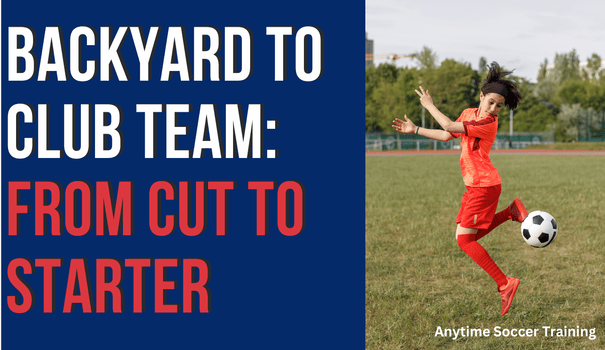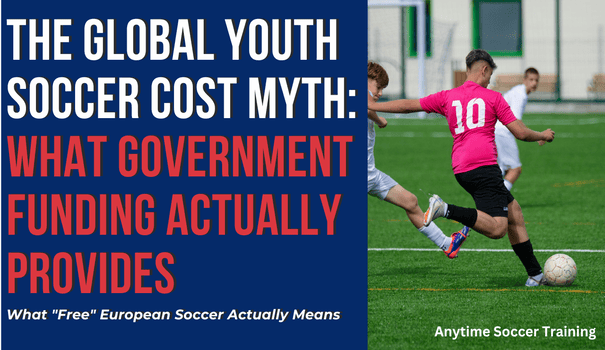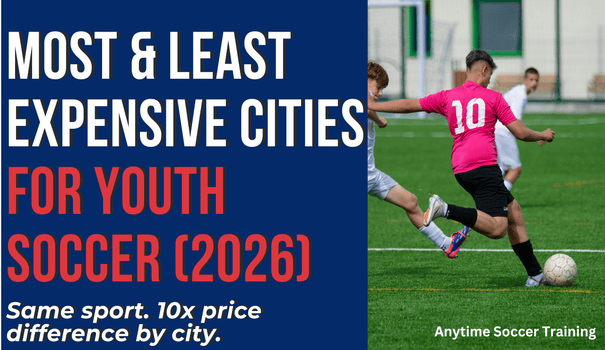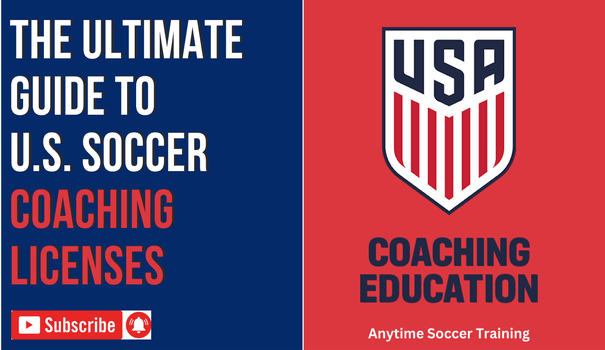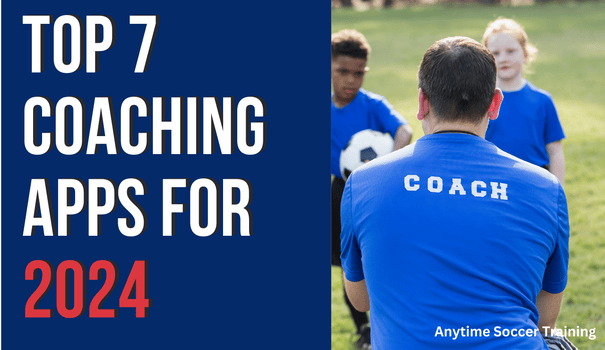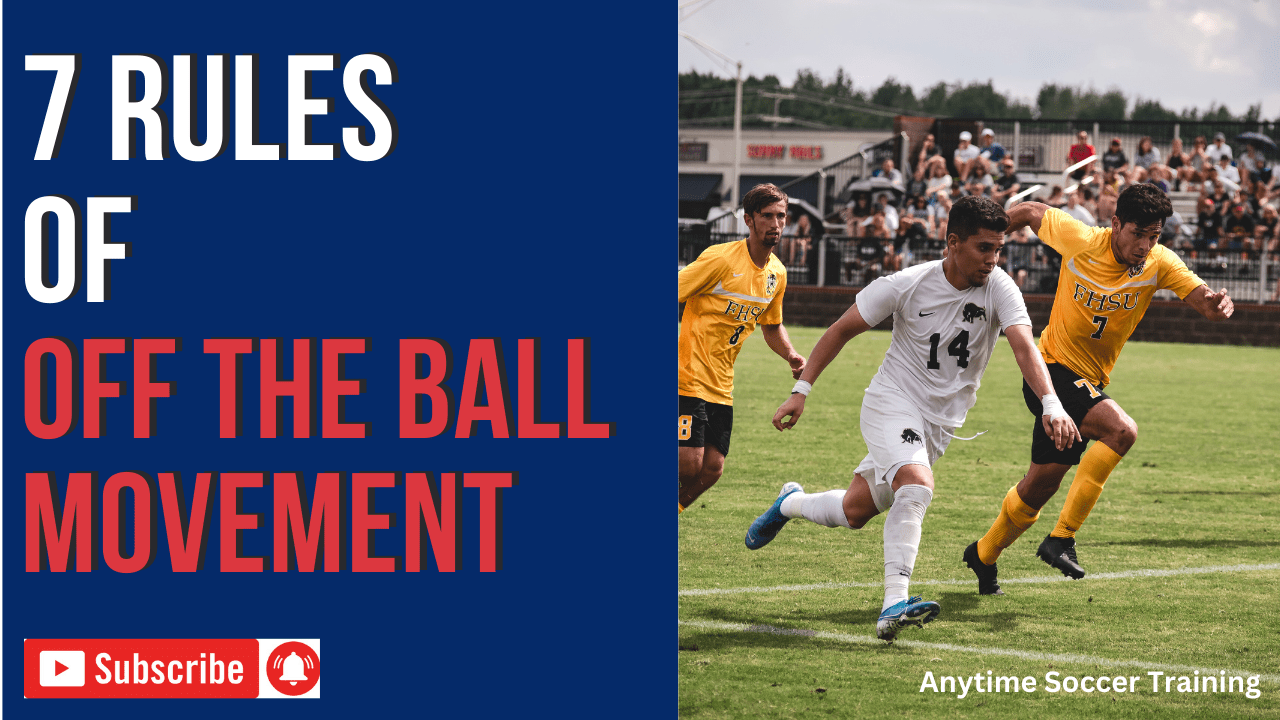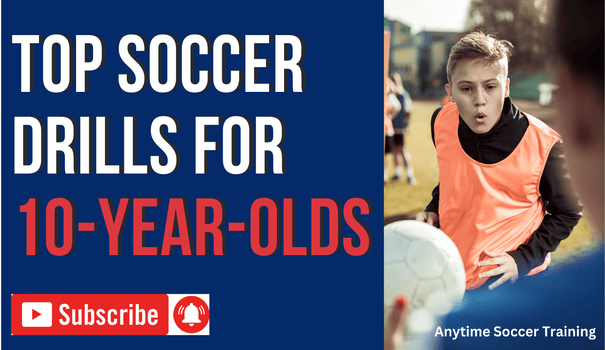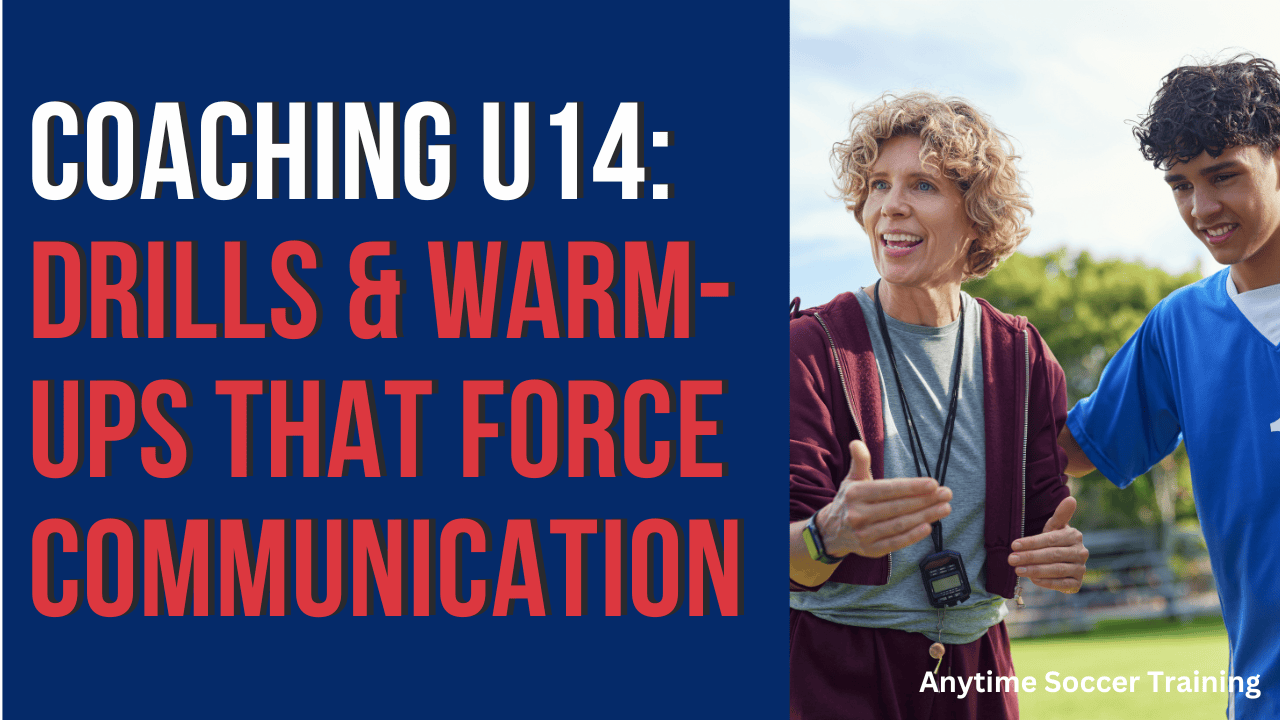
5 Communication Drills That Transform Quiet U14 Teams (Complete Session Plan Included)
How to get U14 players talking on the field—with proven drills, warm-ups, and a complete 90-minute session plan that forces even the quietest teenagers to find their voice.
🗣️ The Silent Team Problem
I recently stepped into a JV coaching role, and I'll be the first to admit: it's been a struggle at times. One challenge that stands out at the U14 level is getting players to consistently communicate on the field. Players often know the right decisions, but if they aren't talking to each other, those decisions break down. This guide shows you exactly how to fix it with drills that make communication non-negotiable.
What You'll Learn in This Guide:
- Why communication matters critically at U14 level
- 5 drills that force players to talk (no optional communication)
- 3 communication-focused warm-ups to set the tone
- Complete 90-minute session plan you can use immediately
- Essential equipment checklist for coaches
- Recommended YouTube channels for more drill ideas
- Practical coaching tips that actually work
Why Communication Matters at U14
At this age, the game moves faster, spaces close quicker, and players need to trust one another enough to speak up. The problem is, many teenagers are naturally quiet, worried about saying the wrong thing, or simply not used to using their voice in the game.
📊 What Communication Achieves:
- Decision-making speed: Players can't rely on just seeing what's around them—hearing teammates gives them information quicker
- Building confidence: When players speak up and are heard, they start to believe in their leadership on the field
- Reducing mistakes: A simple "man on," "time," or "switch" saves countless turnovers
- Team chemistry: Talking binds the group together. It turns a collection of players into a team
Understanding the complete U.S. youth soccer structure helps you see where U14 fits—it's a critical transition age where players move from recreational to competitive soccer, and communication becomes essential for success.
Many U14 players aspire to play at elite levels like MLS NEXT or ECNL clubs, where vocal leadership is non-negotiable. Building communication skills now sets them up for future opportunities.
5 Drills That Force Communication
These aren't suggestions—they're drills designed to make communication mandatory. If players don't talk, they literally cannot complete the drill successfully.
Silent Possession → With a Twist
| Drill Setup | |
|---|---|
| Grid Size | 15x15 yards |
| Format | 5v3 rondo or possession game |
| Players | 8 total (5 possession, 3 defenders) |
| Key Rule | Must call teammate's name before passing |
| Consequence | No call = automatic turnover to defenders |
| Progression Levels | |
|---|---|
| Level 1 | Just call the name before passing |
| Level 2 | Call name + command ("John, turn!" or "Sarah, back!") |
| Level 3 | Receiver must acknowledge verbally before receiving ("Got it!" or "Yes!") |
💡 Why It Works:
Simple, effective, and immediately louder. Players quickly realize that silence equals losing possession. The consequence is instant and teaches the value of vocal communication.
Blind Defender Drill
| Drill Setup | |
|---|---|
| Format | Pairs (1 attacker, 1 defender, 1 commander) |
| Grid Size | 10x10 yards per pair |
| Equipment | Pinnies (for covering eyes), cones, ball per pair |
| Key Rule | Defender closes eyes or covers with pinnie |
| Commander Role | Guides defender with instructions: "Step left," "Drop," "Pressure" |
| Duration | 60 seconds, then rotate roles |
| Coaching Points | |
|---|---|
| Commander | Must be loud, clear, and specific with directions |
| Defender | Must trust and react immediately to verbal cues |
| Attacker | Tries to dribble past while defender relies on coaching |
| Rotation | Every 60 seconds: Commander → Defender → Attacker → Commander |
💡 Why It Works:
Emphasizes how powerful communication is when vision is limited. Players experience firsthand what it feels like to rely completely on vocal direction—building empathy for teammates who need guidance.
Numbers Game
| Drill Setup | |
|---|---|
| Field Size | 30x40 yards with small goals on each end |
| Teams | Split roster into two teams (e.g., 8v8, 10v10) |
| Numbers | Assign each player a unique number (1-10 or more) |
| Key Rule | Coach calls numbers—only those players enter to play |
| Sideline Role | Players NOT called must shout instructions to their number |
| Format | Varies: call 2 numbers = 2v2, call 4 = 4v4, etc. |
| Variations & Progressions | |
|---|---|
| Basic | Call 2-3 numbers for small-sided play |
| Advanced | Call 4-5 numbers quickly: "2, 5, 7, 9!" = instant 4v4 |
| Consequence | If sideline is silent for 5+ seconds, opposing team gets a goal |
| Duration | Play 60-90 seconds, then call new numbers |
💡 Why It Works:
Forces players to support vocally even when they're not directly involved. Sideline players realize their voices directly impact the outcome, teaching them that communication matters whether you're on the field or off.
Call-It Before Receiving Drill
| Drill Setup | |
|---|---|
| Format | Passing patterns, rondos, or possession grids |
| Grid Size | 10x10 to 15x15 yards (depending on format) |
| Key Rule | Players must say their next action before ball arrives |
| Commands | "One touch back," "Turn," "Switch," "Hold," "Away" |
| Consequence | No call = loss of possession OR 5 push-ups/sprint to line |
| Progression Pathway | |
|---|---|
| Stage 1 | Static passing patterns (triangles, squares) with call-outs |
| Stage 2 | Dynamic rondos (4v1, 5v2) with pressure and movement |
| Stage 3 | Small-sided games (4v4, 5v5) where rule still applies |
| Challenge | Add time pressure: must call within 1 second of seeing pass |
💡 Why It Works:
Builds the habit of thinking out loud. Players learn to anticipate their next move and communicate it, which speeds up decision-making for everyone around them.
Freeze & Recall Scrimmage
| Drill Setup | |
|---|---|
| Format | Normal scrimmage (7v7 or full-sided) |
| Field Size | Age-appropriate (half field or full field) |
| Key Rule | Coach randomly shouts "FREEZE!" every 2-3 minutes |
| Freeze Action | All players stop immediately in position |
| Question | "What did you hear? Who was talking to you?" |
| Consequence | Can't answer = team loses possession or does consequence |
| Coaching Points | |
|---|---|
| Selection | Randomly select players (don't just pick quiet ones) |
| Celebration | Praise players who can recall specific instructions they heard |
| Team Silence | If entire team is silent, stop play immediately and address it |
| Positive Focus | Ask: "Who was the loudest?" or "What was the best call you heard?" |
| Frequency | Freeze 4-6 times per 20-minute scrimmage segment |
💡 Why It Works:
Accountability check. If players can't remember what they heard, the team knows it needs to be louder. This drill makes communication visible and measurable.
Bonus: 3 Communication Warm-Ups
Warming up is the perfect time to set the tone. Instead of going through the motions quietly, get your players talking early with these communication-focused warm-ups:
1. Name-Call Passing Circle
| Warm-Up Setup | |
|---|---|
| Formation | Large circle (15-20 yards diameter) |
| Players | Entire team in one circle (or split into two if 20+ players) |
| Balls | Start with 1 ball, add 2-3 balls as players improve |
| Key Rule | Must shout receiver's name before passing |
| Progression | Add one command with name ("Sarah, turn!" or "Mike, one-touch!") |
| Duration | 5-7 minutes |
👉 Why it works: Builds habit of clear, early communication while warming up first touch. Low-pressure environment to practice being loud.
2. Echo Jog
| Warm-Up Setup | |
|---|---|
| Formation | Pairs or small groups (3-4 players) jogging together |
| Area | Around the field perimeter or in open space |
| Leader Role | One player calls out commands |
| Commands | "Turn left," "High knees," "Shuffle," "Sprint 5 yards," "Backwards" |
| Echo Rule | Teammates must echo command loudly while executing |
| Rotation | Change leaders every 60 seconds |
| Duration | 5-7 minutes |
👉 Why it works: Encourages voices right away and makes warm-up fun. Gets players comfortable being loud from the first minute of practice.
3. Commanded Rondo
| Warm-Up Setup | |
|---|---|
| Format | 4v1 or 5v2 rondo |
| Grid Size | 10x10 yards |
| Key Rule | Before passing, player must call out one piece of info |
| Commands | "Time," "Man on," "Turn," "Switch," "Back" |
| Freeze Check | Coach can freeze and ask: "Who gave you info?" |
| Defender Win | If silence lasts 3+ seconds, defenders win possession |
| Duration | 7-10 minutes (rotate defenders every 60-90 seconds) |
👉 Why it works: Reinforces the "see it, say it, play it" cycle. Combines technical warm-up with vocal accountability.
For more drill ideas, check out our free soccer drills library and 101 free YouTube training videos organized by age group.
Complete 90-Minute Session Plan: Building Communication
Here's a ready-to-use session plan you can implement at your next practice. Every element is designed to force vocal communication:
📋 Session Overview
Theme: Forcing Players to Use Their Voice
Objective: Improve communication, awareness, and decision-making in game-like situations
Duration: 90 minutes
Age Group: U14 (adaptable to U13-U16)
Equipment Needed: See equipment section below
| Time | Activity | Key Focus |
|---|---|---|
| 0-10 min | Echo Jog Players jog in pairs. One calls movements ("high knees," "side shuffle," "turn left"), teammates echo loudly |
Immediate vocal engagement from minute one |
| 10-20 min | Name-Call Passing Circle Large circle, one ball. Must call name before passing. Add progression: passer calls command too |
Builds habit of naming and commanding |
| 20-35 min | Silent Possession With Name Rule 5v3 rondo. Must say target's name before passing. Forgot = turnover. Progress to receiver calling next action |
Forces think and speak before play |
| 35-55 min | Numbers Game Split teams, assign numbers. Coach calls numbers, those sprint in to play 3v3. Sideline shouts instructions |
Creates chaos rewarding loud, clear communication |
| 55-80 min | Freeze & Recall Scrimmage 7v7 or full-sided. Every few minutes: "FREEZE!" Ask random player what they heard |
Reinforces accountability for listening and talking |
| 80-90 min | Cool-Down & Reflection Light jog + stretches. End with 3 questions: (1) Who did you hear most? (2) What command helped you? (3) What will you say louder? |
Embeds lesson mentally, not just physically |
⚠️ Coaching Tips for Success:
- Keep your energy up—if you're loud, players will mirror you
- Don't let drills continue if players aren't talking. Stop, reset, and demand communication before resuming
- Reward the effort to speak, even if the soccer action isn't perfect
- Identify 2-3 naturally loud players and position them strategically to model behavior
- Use consequences (push-ups, sprints) sparingly—focus on positive reinforcement
Essential Coaching Equipment for U14 Practices
Having the right gear makes these drills run smoothly. Here's what you need:
For grids, boundaries, and marking spaces. Pro Disc Cones (50-Pack) →
Essential for small-sided games and Numbers Game drill. PUGG 6-Foot Pop-Up Goals →
Need multiple balls for rondos and passing circles. GoSports Soccer Balls (6-Pack with Pump) →
For identifying teams and covering eyes in Blind Defender drill. Youth & Adult Pinnies (Set of 12) →
For explaining drills and tactical concepts. Murray Sporting Goods Dry-Erase Clipboard →
For freeze moments and timing activities. Fox 40 Classic Whistle with Stopwatch →
Looking for more coaching resources? Check out the complete US Soccer coaching licenses guide to understand the certification pathway for youth coaches.
Recommended YouTube Channels for More Drill Ideas
Looking for additional communication drills and coaching resources? These YouTube channels consistently provide high-quality training content for youth coaches:
1. Coach Rory Soccer
Channel: @CoachRorySoccer
What You'll Find: Excellent communication-focused drills, rondo variations, and U14-specific training sessions. Coach Rory specializes in making complex concepts accessible for youth players.
Best For: Club coaches, parent trainers, and anyone coaching competitive U13-U16 teams
2. England Football Learning
Channel: @EnglandFootballLearning
What You'll Find: Official FA content with professional coaching methodology. Outstanding resources on player communication, positional play, and tactical awareness at youth levels.
Best For: Coaches seeking professionally-developed training content aligned with elite academy standards
3. Anytime Soccer Training - 101 Free YouTube Drills
Resource: 101 Free YouTube Training Videos by Age Group
What You'll Find: Comprehensive library of 101 free training sessions organized by age group, including U14-specific content. Follow-along videos covering ball mastery, passing, shooting, dribbling, and team play.
Best For: Parent trainers, volunteer coaches, and anyone looking for ready-to-use video training sessions
💡 How to Use These Resources:
- Watch 2-3 videos before planning your weekly sessions
- Adapt drills to add communication requirements (name-calling, freeze moments, etc.)
- Mix content from multiple sources to keep training fresh
- Subscribe to channels for regular updates and new drill ideas
Practical Tips for Coaches
Beyond the drills themselves, here's what actually works when coaching communication at U14 level:
1. Set the Standard Early
Communication is a core skill, not an optional extra. From day one of your season, make it clear that silence is not acceptable. Explain why communication matters—not just that it matters.
2. Praise the Talkers
Encourage the effort, not just the execution. If a player calls out but makes the wrong decision, praise the communication first, then correct the decision. You want players to keep talking even when they're uncertain.
3. Keep It Simple
Stick with three clear commands players can master:
- "Time" - You have space/time to turn
- "Man on" - Defender is pressuring you
- "Switch" - Change the point of attack
Once these become automatic, add more: "Away," "Hold," "Support," "Drop," etc.
4. Rotate Leadership
Make different players responsible for being the loudest voice each week. Assign a "Communication Captain" whose job is to lead vocal organization. This distributes responsibility and prevents relying on just 1-2 loud players.
5. Film and Review
Record scrimmages and show players clips where communication (or lack of it) directly affected the play. Visual evidence is powerful for teenagers who might not believe you otherwise.
For more coaching strategies, explore how to become a rec coach superhero with volunteer coaching best practices.
Final Thoughts: Communication Isn't Just About Soccer
I'll be honest: as a JV coach, I've been frustrated when players stay quiet. I know they see the play unfolding, but silence kills momentum.
What I've learned is that communication isn't just about soccer—it's about confidence, personality, and trust.
When you create an environment where players feel safe to speak up, where their voices are valued, and where communication is rewarded, you're teaching life skills that extend far beyond the soccer field.
🎯 The Big Picture:
Teaching U14 players to communicate on the field builds confidence, leadership, and accountability that serves them in school, work, and relationships. You're not just coaching soccer—you're developing young leaders.
These drills work. The session plan works. But they only work if you commit to making communication a non-negotiable standard in every practice.
Your team will be louder, more confident, and more connected. And when game day comes, you'll hear voices all over the field—because you built the habit in training.
Need More Coaching Resources?
Whether you're coaching at the grassroots level or working with competitive teams, having access to structured training content makes your job easier and your players better.
Anytime Soccer Training provides:
- 5,000+ follow-along training videos organized by age and skill level
- Team licensing for clubs and coaches ($6/player/year)
- Communication-focused drills and team play sessions
- Free resources including 101 YouTube drills by age group
Related Resources
📚 More Coaching & Training Guides
- 101 Free YouTube Training Videos by Age Group - Organized library
- Become a Rec Coach Superhero - Volunteer coaching guide
- US Soccer Coaching Licenses Guide - Complete certification pathway
- Soccer Tactical Models & Drills Guide - Age-appropriate tactics
- Free Soccer Drills for Kids - Ready-to-use activities
- 10 Ball Mastery Drills (10 Minutes) - Quick skill development
- Complete Guide to U.S. Youth Soccer Structure - Understanding the system
About the Author: Neil Crawford is the founder of Anytime Soccer Training and a JV soccer coach. He understands the challenges of getting teenage players to communicate on the field and has developed practical solutions that work. His approach combines research-backed coaching methods with real-world experience training teams at multiple competitive levels.
